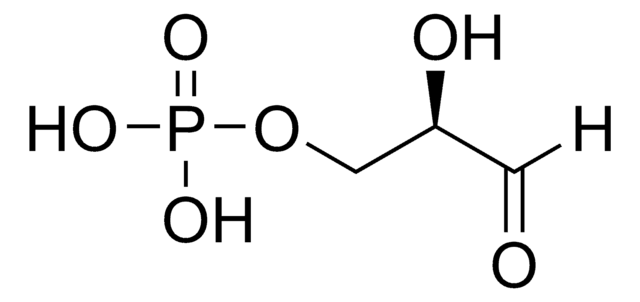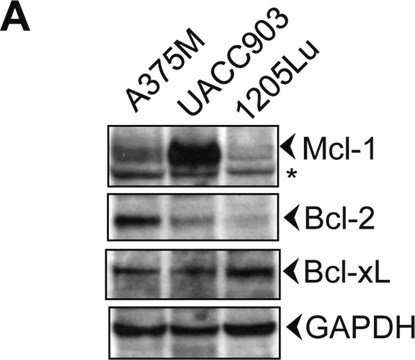Wszystkie zdjęcia(1)
Kluczowe dokumenty
SRE0024
Glyceraldehyde-3-phosphate dehydrogenase human
recombinant, expressed in Escherichia coli
Synonim(y):
D-Glyceraldehyde-3-phosphate: NAD+ oxidoreductase (phosphorylating), GAPDH, Triosephosphate dehydrogenase
Zaloguj sięWyświetlanie cen organizacyjnych i kontraktowych
About This Item
Numer EC enzymu:
1.2.1.12
Kod UNSPSC:
12352204
NACRES:
NA.54
Polecane produkty
rekombinowane
expressed in E. coli
Poziom jakości
aktywność właściwa
≥80 units/mg protein
temp. przechowywania
−20°C
Powiązane kategorie
Opis ogólny
Glyceraldehyde-3-phosphate dehydrogenase (GAPDH) localizes to the cytoplasm but can be translocated to the nucleus depending on cellular conditions. It is a tetramer containing identical chains. The gene encoding GAPDH is localized on human chromosome 12p13.
Zastosowanie
Human glyceraldehyde-3-phosphate dehydrogenase has been used as a positive control for hydrogen sulfide treatment to detect sulfhydration of protein targets.
Działania biochem./fizjol.
Glyceraldehyde-3-phosphate dehydrogenase (GAPDH) catalyzes the reversible oxidative phosphorylation of glyceraldehyde-phosphate, which is a critical energy-yielding step in carbohydrate metabolism. It binds to several proteins including actin, tubulin, amyloid precursor, polyglutamine peptides, DRPLA (dentatorubral-pallidoluysian atrophy) and huntingtin. Phosphorylated GAPDH associates with cytoskeletal elements and controls microtubule dynamics in the early secretory pathway. GAPDH is also a component of the functional GAIT (interferon-?-activated inhibitor of translation) mRNP (messenger ribonucleoprotein). GAPDH expression is dysregulated during melanoma progression.
Definicja jednostki
One unit will reduce 1.0 μmole of 3-phosphoglycerate to D-glyceraldehyde 3-phosphate per minute in a coupled system with 3-phosphoglyceric phosphokinase (3-PGK) at pH 7.6 at 25 °C
Postać fizyczna
This product is recombinant, human GAPDH expressed in E. coli with an N-terminal histidine tag and has a predicted molecular mass of 37,984 Da. The product is lyophilized from a buffered solution with stabilizers.
Inne uwagi
Alternative number: CAS Number 9001-50-7
Ta strona może zawierać tekst przetłumaczony maszynowo.
Hasło ostrzegawcze
Warning
Zwroty wskazujące rodzaj zagrożenia
Zwroty wskazujące środki ostrożności
Klasyfikacja zagrożeń
Eye Irrit. 2
Kod klasy składowania
11 - Combustible Solids
Klasa zagrożenia wodnego (WGK)
WGK 3
Temperatura zapłonu (°F)
Not applicable
Temperatura zapłonu (°C)
Not applicable
Wybierz jedną z najnowszych wersji:
Certyfikaty analizy (CoA)
Lot/Batch Number
Nie widzisz odpowiedniej wersji?
Jeśli potrzebujesz konkretnej wersji, możesz wyszukać konkretny certyfikat według numeru partii lub serii.
Masz już ten produkt?
Dokumenty związane z niedawno zakupionymi produktami zostały zamieszczone w Bibliotece dokumentów.
Klienci oglądali również te produkty
Deregulation of glyceraldehyde-3-phosphate dehydrogenase expression during tumor progression of human cutaneous melanoma.
Ramos D, et al.
Anticancer Research, 35(1), 439-444 (2015)
Mutant huntingtin: nuclear translocation and cytotoxicity mediated by GAPDH.
Bae B, et al.
Proceedings of the National Academy of Sciences of the USA, 103(9), 3405-3409 (2006)
Nuclear-translocated glyceraldehyde-3-phosphate dehydrogenase promotes poly (ADP-ribose) polymerase-1 activation during oxidative/nitrosative stress in stroke.
Nakajima H, et al.
The Journal of Biological Chemistry, 290(23), 14493-14503 (2015)
Hydrogen sulfide inhibits Kir2 and Kir3 channels by decreasing sensitivity to the phospholipid PIP2.
Ha J, et al.
The Journal of Biological Chemistry, RA117-RA117 (2018)
Glyceraldehyde-3-phosphate dehydrogenase is phosphorylated by protein kinase Ciota /lambda and plays a role in microtubule dynamics in the early secretory pathway.
Tisdale E J.
The Journal of Biological Chemistry, 277(5), 3334-3341 (2002)
Nasz zespół naukowców ma doświadczenie we wszystkich obszarach badań, w tym w naukach przyrodniczych, materiałoznawstwie, syntezie chemicznej, chromatografii, analityce i wielu innych dziedzinach.
Skontaktuj się z zespołem ds. pomocy technicznej









